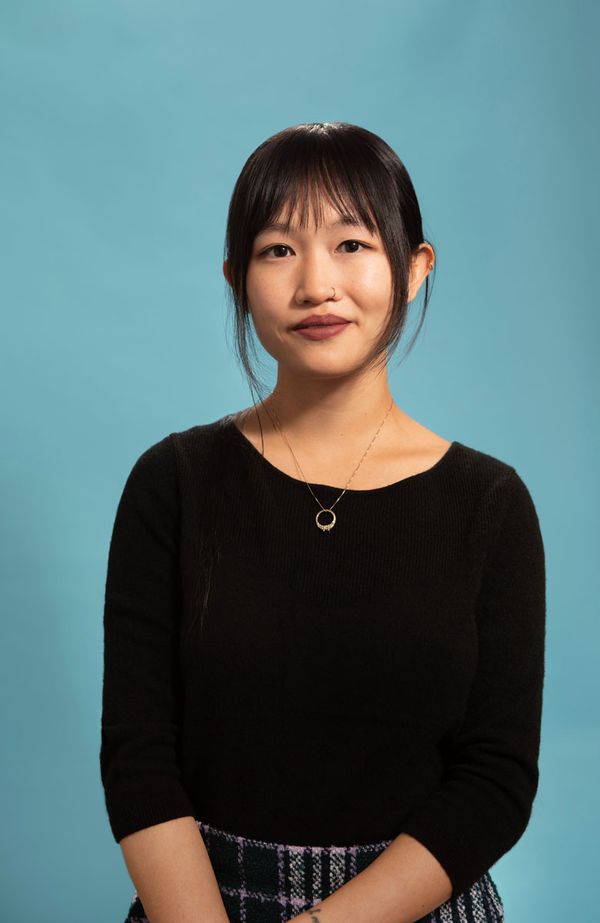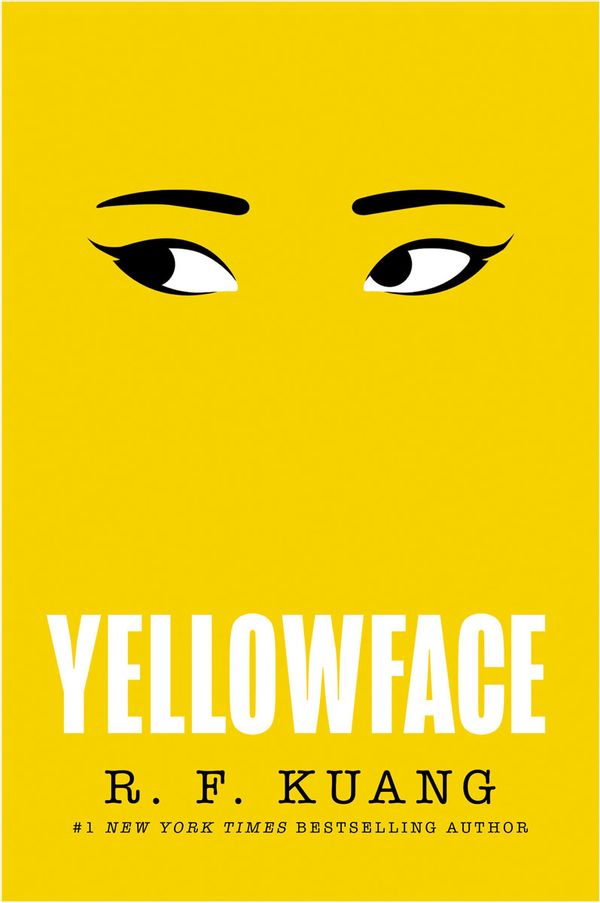When I ask R. F. Kuang how her work as an academic has influenced her work as novelist, she says, "Mostly it means that I don't have enough time to sleep!"
The author of five novels, including a bestselling trilogy that started in 2018 with "The Poppy War," Kuang is a PhD student at Yale University, studying East Asian Languages and Literatures. Her fourth novel, "Babel: An Arcane History" drew upon her love of language, literature and academic settings. She says, "I think the things that I research and am thinking about in an academic sense always trickle into my fiction, which is why so many of my main characters tend to be students."
But in her latest novel, "Yellowface," they are writers. "Yellowface" is a standalone novel about two young novelists, one who is Asian and one who is white. One who is hugely successful and one who has yet to make it. One who dies tragically and early — and one who steals her friend's unpublished manuscript and racial identity. "Yellowface" is a novel about cultural appropriation, ambition, racism and the scandal-laden publishing industry, but at the story's core, according to its author, it's a thriller about friendship. And what goes wrong.
Salon talked with Kaung about her new book, unreliable narrators and the publishing industry.
This interview has been lightly edited for clarity and condensed.
How did you first start writing fiction?
"I thought it would be fun to jump to a novel that reads more like scrolling through Twitter."
I think most writers I know just have always written compulsively, and that was certainly the case with me. I was always coming up with stories and writing fan fiction, writing fictional versions of a diary that wasn't about me but about other characters who I thought were cooler. But I didn't write anything for publication until I was in college and took a gap year in between my sophomore and junior years. I went to Beijing for a bit. And that's when I wrote my first novel, which became "The Poppy War."
And you never looked back.
Well, I signed a few book contracts, so I wasn't allowed to look back!
All of your books so far, the "Poppy" trilogy, "Babel" and now "Yellowface" have been in pretty different styles. What inspires you to change your writing style in such a way for each project?
Oh, I just get bored really easily. I hate doing the same thing multiple times in a row. And I had to do that for "The Poppy War" trilogy. I found it stifling. I think it's really hard to work on one project for five years, between the ages of 19 and 24, which is how old I was when I started and finished that trilogy. I was changing so much as a person. I graduated college, I was becoming an adult, finding my own apartment for the first time. That whole time I was working on the same characters, the same plot lines, the same themes that I thought of when I was a teenager. So by the time I wrapped up "The Poppy War" trilogy, I told myself: I'm never gonna lock myself into a project that doesn't have the ability to account for myself changing again.
So, I switched gears and instead of getting another epic fantasy novel, I did a big doorstopper historical fantasy. And then after that, I thought it would be fun to jump to a novel that reads more like scrolling through Twitter. I just really love jumping between voices and experimenting and giving myself new creative challenges. Certainly my favorite authors just put up the same kind of novel over and over again for their entire lives. But I could never do that. I think it would feel like creative death.
 R.F. Kuang (John Packman)And that's one definition of an artist, too: someone who is constantly moving, constantly changing, constantly experimenting. Do you read extensively in the genre you're writing a book in before or during the writing? For example, "Yellowface" is more literary fiction. Did you read a lot of literary, commercial novels?
R.F. Kuang (John Packman)And that's one definition of an artist, too: someone who is constantly moving, constantly changing, constantly experimenting. Do you read extensively in the genre you're writing a book in before or during the writing? For example, "Yellowface" is more literary fiction. Did you read a lot of literary, commercial novels?
"It's kind of like sitting at the bar with your nastiest friend while she insults everybody who walks through the doors. It's not a voice that we want to adopt or even a voice that we want around us all the time, but it's really fun to read."
I always try to read as widely as I can in the genre that I'm entering. I started doing this deliberately when I was drafting "Babel," because I knew it's very easy to spot a bad imitation of Victorian description, and the only way that I was going to get away with it is if I spent the time with the Victorians that I did, able to convincingly imitate their synthesis and colloquialism, the rhythm and flow of how they put words together. I went back and read a lot of Dickens, a lot of Thackeray; I read Austen, even though she's not Victorian era, and I had a lot of fun with that. When I was switching to "Yellowface," I made it a priority to digest a lot of fast-paced, very quick, very contemporary literary fiction.
And in particular, I'm interested in psychological thrillers and female-led psychological thrillers. I'm detecting a similar voice throughout a lot of our more popular works in that genre, which is this really nasty, condescending narrator who you're kind of compelled or are addicted to listening to because she is so mean, and she's so judgy. It's kind of like sitting at the bar with your nastiest friend while she insults everybody who walks through the doors. It's not a voice that we want to adopt or even a voice that we want around us all the time, but for whatever reason, it's really fun to read.
It really does lend to the compulsive nature of the book because we keep reading to see if she's gonna get hers, if somebody's finally going to change her, or if she's going to change. Was it hard to write from her voice, the voice of the narrator, June? Was it uncomfortable — or even therapeutic?
No, it wasn't hard at all. It felt very easy. In fact, it was just a lot of fun. I was just so gleefully bad. It's similar to just mucking around in mud and getting yourself dirty. I think it was cathartic and just really entertaining, to look at the world through Juniper Song's eyes.
So how would you describe "Yellowface," the book that Juniper Song narrates?
It's this ridiculous thriller that satirizes the publishing industry by looking at the relationship between two friends: a white writer and an Asian writer. The Asian writer dies in a freak pancake-eating contest. And the white writer, our protagonist Juniper Song, steals her unpublished manuscript and passes it off as her own all the while passing herself off as Chinese American. So, it does look at things like cultural appropriation and racism in the industry and the ways we can commodify and talk about racial identity in very reductive terms. But at the heart of it, it's just a psychological thriller about a relationship between two best friends that's gone very badly wrong.
"There's just a kind of demonic, unhinged quality about all of these books, because we're living demonic, unhinged lives."
I read an interview recently where you characterize the book as your pandemic novel. Can you say more about that?
I think we can always tell when a novel is somebody's pandemic novel, in a lot of books that came out in late 2022 and early 2023. Because if you account for the production cycle always being like 12 to 18 months, then you know somebody was drafting in late 2020, early 2021. There's just a kind of demonic, unhinged quality about all of these books, because we're living demonic, unhinged lives. A lot of us are very isolated. I had been locked down for so long, it was driving me stir crazy. It was impossible to see my friends. And when you spend that much time with yourself, you also spend a lot of time with your ugliest feelings and there's nothing to distract you; you've nowhere to send them. So it all gets channeled into these very absurd books.
 Yellowface by R.F. Kuang (Courtesy of William Morrow)We talked a little bit about the sort of villain of the book, the writer June, who's also the narrator. She's often unlikable, unreliable. And the more likeable character, the writer Athena, is killed off early, which is not a spoiler, of course — but was it hard to let that character go?
Yellowface by R.F. Kuang (Courtesy of William Morrow)We talked a little bit about the sort of villain of the book, the writer June, who's also the narrator. She's often unlikable, unreliable. And the more likeable character, the writer Athena, is killed off early, which is not a spoiler, of course — but was it hard to let that character go?
Not really, because I didn't feel like I let her go. Obviously, she dies in the first chapter. But her specter hangs over the entire novel. We're constantly getting pieces of her through flashbacks or warped versions of her through recounting. It was fun to keep her a consistent presence kind of looming over everyone's shoulders — and also this unstable presence, where you're not really sure if you're being told the truth about her, or if you're receiving somebody's biased account of their sour relationship with her. So I think it's very prevalent throughout the rest of this book. I didn't feel like I had to let her go.
That leads into something I want to ask you, which is that Athena's not perfect either. We get a slow reveal of her character. Was that a deliberate choice to resist this kind of model minority, perfect character? Or is it filtered through June and others' perspectives?
We're definitely getting a warped perspective on Athena. And I like to think that maybe she's not as nasty or as much of a b**** as everybody's making her out to be. At the same time, she's probably not a great person, not somebody you'd want to be close friends with. And that's because I think novels about perfect victims are so boring. It would not be half as fun to read if Athena was just this saintly, innocent women who had all her work stolen from [her]. I think I have a lot more fun writing when everybody's morally gray.
One of the things I love about the novel is that it's not just about the experiences of writers. It's also about the struggles of working in the publishing industry. Being a lower level editor, being a sensitivity reader, being a young employee of color in the industry. Was it important for you to cover so much of the publishing world?
"I remember acutely the feeling of walking into a bookstore for a signing and not having a single person show up."
I wanted to explore how tough it can be on the other side. I think authors like to complain about their publishers a lot; publishers probably like to complain about their authors a lot. The truth is that everybody's struggling in this industry together. And oftentimes, we are frustrated that your editor is not responding to your emails. That's because he has a million other book submissions to work on, he's not getting paid enough to do it. And there's just not enough hours in the day to cover the workload that they've been assigned. I think we're seeing a lot of breaking points in the industry.
It was interesting timing that the HarperCollins union went on strike while "Yellowface" was in production. Obviously, I'd written the book before strikes were even being discussed. But watching that all play out and listening to conversations about how the industry changed in order to better serve their employees, which in turn better serves their authors, I think it helps the importance of putting out a book like "Yellowface" right now.
I was going to ask if the strike had impacted the book, the edits or production in some way.
The book was in pretty late in production by the time the strike happened. It didn't change the draft at all. But, you know, it did help remind me what we're all fighting for.
What was your publishing journey like, especially for your first novel?
There's been a lot of ups. There's been a lot of downs. It's interesting that people keep assuming that Athena is based on myself when actually I have very little in common with her aside from being erased and gendered in the same ways. Athena is this kind of Cinderella story, overnight bestseller, has never known failure, and my early publishing experience was a lot more like June's. The reason why I'm able to write sympathetically about her resentment and frustration with the industry is because I've had those thoughts. I've had to share in that frustration. I remember acutely the feeling of walking into a bookstore for a signing and not having a single person show up. The humiliation, the shame, the sheer awkwardness — and the bookstore manager is like, Oh, no, maybe it's time to pack up. And the heartbreak of watching your sales numbers dwindle. I know it all.
Want a daily wrap-up of all the news and commentary Salon has to offer? Subscribe to our morning newsletter, Crash Course.
I don't think I've read a more real rendering of what the publishing process is like as an author: how helpless you feel, and the pressure. As a novelist, it was very relatable. Were you at all worried about reactions from publishers over how this book is critical of them or of the industry?
Obviously, I hoped that somebody would buy it. Somebody did and they're very enthusiastic about it. My agent, I think, was more worried about offending people than I was. She actually didn't want to put it on submission at all when I sent the first 100 pages, because it is so in-your-face and mean in its tone. But what I found through the process is that I think people in publishing are also very ready, and are fed up with the issues discussed in the book and they're ready to talk about it and talk about it openly. I've had just an amazing time working on this book with my team in the U.S. and the UK, because everyone has gotten kind of unhinged about the production process. I mean, the early galleys that they put out in the UK, the cover was hilarious, because they were just mocking every single thing, every single strategy that we used on my books in the past. And in the U.S., it really felt like my editors were just egging me on and encouraging to make the book even more transparent and more vicious and more pointed about the realities of the industry.
It's good to remember always that there are a lot of people in this industry who are there because they care about the work and their authors, and about getting stories out to audiences which have never had that kind of platform or reach before — and they're not getting paid nearly enough to do it. But I think I'm very fortunate to work with that kind of person.



Shares